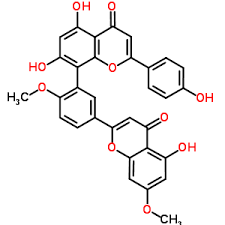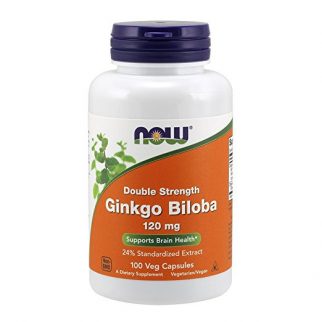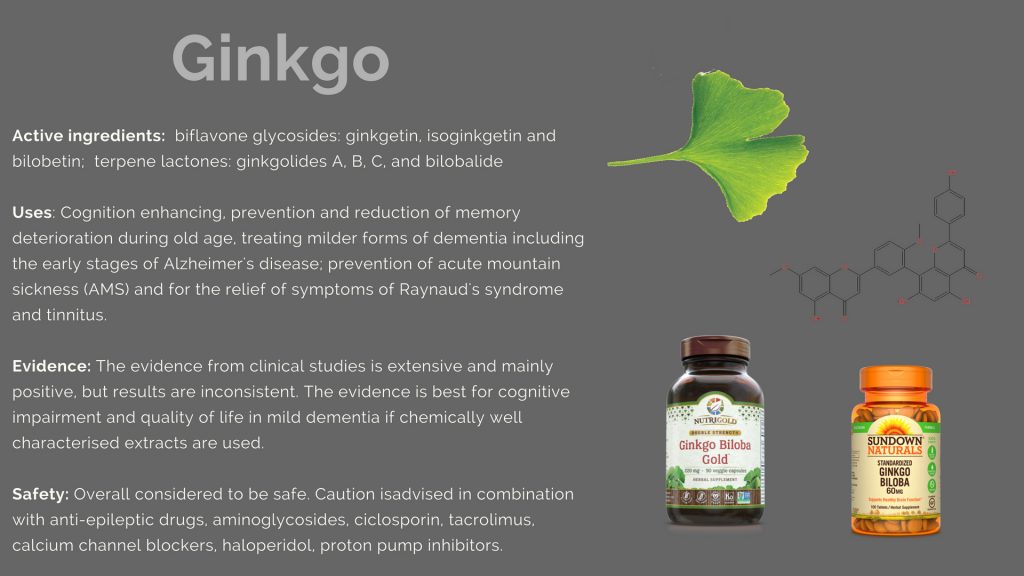Contents
- What is Ginkgo?
- Ginkgo family, other names, origin, and botanical drug used
- Ginkgo chemical composition and main compounds
- Ginkgo indications and uses
- Ginkgo dosage
- Ginkgo evidence of efficacy
- Ginkgo neuroprotective and cognitive enhancing properties
- Ginkgo use for Alzhemier disease
- Ginkgo effects on blood perfusion
- Ginkgo use for cardiovascular and related disorders
- Ginkgo use for tinnitus
- Ginkgo use for macular degeneration
- Ginkgo for prevention of altitude cerebral oedema
- Ginkgo possible mechanisms of action
- Ginkgo side effects
- Ginkgo interactions
- Ginkgo interaction with antiplatelets drugs
- Ginkgo interaction with calcium channels antagonists
- Ginkgo interaction with antidepressants
- Ginkgo contraindications
- Ginkgo top 5 selling products
What is Ginkgo?
Ginkgo biloba, or just ginkgo or gingko, the ginkgo tree or the maidenhair tree, is the only living species in the division of Ginkgophyta, as all others species are being extinct.
Ginkgo is found in fossils dating back 270 million years. Native to China, the tree is widely cultivated, and was cultivated early in human history. It has various uses in traditional medicine and as a source of food.

Ginkgo biloba is one of the most frequently prescribed herbal preparations in Germany and an over-the-counter herbal preparation in the United States.
Indications for its use are generally in one of following categories: peripheral vascular, cerebrovascular, or tissue damage. Most randomized control trials (RCTs) use the Ginkgo biloba special extract EGb 761
Ginkgo family, other names, origin, and botanical drug used
Family: Ginkgoaceae
Other names: Fossil tree; Kew tree; maidenhair tree
Origin: Ginkgo is known as one of the oldest living species that is widely distributed in eastern Asia, especially China, Japan and Korea. Now, the tre is also widely cultivated in Europe and North America.
The seeds have been used as a food and in traditional Chinese medicine, have been used for the treatment of asthma, cough and enuresis for over 5000 years.
Botanical drug used: Leaf, seeds
Ginkgo chemical composition and main compounds
The main active constituents are considered to be the biflavone glycosides, such as ginkgetin, isoginkgetin and bilobetin; and the terpene lactones, the ginkgolides A, B, C, and so on, and bilobalide.
Ginkgolic acids are found in the seeds (which are eaten as a food in Asia) and are present in trace amounts in the leaves.
Much of the research, and most of the clinical studies, have been conducted using special extracts such as EGb 761® (or Li 1370®) which are standardised to approximately 24% (25%) ginkgo flavone glycosides and 6% terpene lactones.
These contain limited amounts of ginkgolic acids (usually <5 ppm) which are potentially toxic, although no clinical cases of harm have been reported from products with greater amounts.
The main threat to the safety of a ginkgo product is a lack of quality control. Analysis of commercial products in the Netherlands showed a different chemical composition to that stated on the label in 25 out of 29 sampled products.
A reproducible, standardised herbal extract of good quality, free from adulteration or contamination, can only be guaranteed in a THR product.

Ginkgo indications and uses
- Gingko is used mainly to enhance cognition, and to prevent or reduce memory deterioration during old age, and in the milder forms of dementia including the early stages of Alzheimer’s disease.
- It is also used for the prevention of acute mountain sickness (AMS)
- It is registered under the THMPD for the relief of symptoms of Raynaud’s syndrome and tinnitus.
Ginkgo dosage
As a dietary supplement, ginkgo dosages range from 80 mg to 240 mg of dry extract divided into 2 or 3 daily doses, with an average daily recommended dose of 120 mg. The German Commission E recommends 120 to 240 mg of extract 2 to 3 times daily for cerebral insufficiency.
Dosages of ginkgo as high as 720 mg/d have been used in clinical trials for dementia, memory, and circulatory disorders Significant improvement on 1 or more outcome measures is associated with dosages between 120 and 300 mg/d for durations of 3 to 12 weeks.
Treatments lasting 4 to 6 weeks are generally needed before positive effects can be expected when ginkgo is taken for disorders of memory, mood, or physiologic function.
In 2014, the EMA issued a daft monograph proposing that 240 mg/day of a dry extract (DER 35-67:1, extraction solvent: acetone 60% m/m) could be used for the improvement of (age-associated) cognitive impairment and of quality of life in mild dementia.
Ginkgo evidence of efficacy
The evidence from clinical studies is extensive and mainly positive, but results are inconsistent. The evidence is best for cognitive impairment and quality of life in mild dementia if chemically well characterised extracts are used.
Based on recent systematic reviews there is more limited evidence at a clinical level, but trials are very varied as to baseline and outcome measures used, so comparisons are difficult.
Numerous clinical trials have been performed using G. biloba extracts (mostly EGb761, Li 1370, and chemically similar products) and there is considerable experience of the clinical use of these extracts, mostly in Continental Europe.
When assessed for cognitive impairment and dementia, the most recent Cochrane review showed that the evidence available for ginkgo is inconsistent and unreliable.
It has been concluded that future research with EGb761 targeting cognitive impairment in old age is warranted as there is promising data from both pre-clinical and clinical studies.
A study assessing the association between intake of EGb761 and cognitive function in 3612 nondemented elderly adults over a 20-year period found that cognitive decline in this population was lower in subjects who reported using EGb761 than in those who did not show beneficial effects of EGb 761® in geriatric patients with mild cognitive disjunction.
Ginkgo preparations were included in a Cochrane review (as were donepezil, memantine and rivastigmine) on treatments for memory disorder in adult patients with multiple sclerosis (MS).
No convincing evidence was found to support any of the agents as effective treatments for memory disorder in MS patients, although all were found to be safe and well tolerated.
A systematic review and meta-analysis on the use of ginkgo in neuropsychiatric disorders concluded that there is sufficient available evidence to support its use in patients with dementia and as an adjunctive therapy in schizophrenic patients, but larger, multicentre studies should be carried out.
Ginkgo neuroprotective and cognitive enhancing properties
Ginkgo’s putative neuroprotective and cognitive enhancing properties have provided support for its use in treating neurologic, psychiatric, functional, and physiologic symptoms including problems with memory, information processing, attention and concentration, psychomotor function, mood, fatigue, and activities of daily living.
Meta-analyses indicate that the cognitive domains yielding the largest proportion of significant effects versus placebo are :
- Fluid intelligence (37.8%)
- Selective attention (43.7%)
- Short-term and long-term verbal and visual memory (ranging from 28% to 33%)
- executive functions (eg, planning 33.2%, working memory 20.7%, flexibility 24.4%, and processing speed 33.0%)
In an RCT of patients with multiple sclerosis, ginkgo ameliorated symptoms of fatigue and improved measures of symptom severity and functional outcome.
Individuals in the ginkgo group showed more improvement on 4 or more measures with significantly larger effect sizes.
In a 4-week RCT involving patients (with generalized anxiety disorder (GAD) and adjustment disorder with anxious mood, the ginkgo-treated groups showed a significant dose-dependent reduction on the Hamilton Rating Scale for Anxiety.
Ginkgo use for Alzhemier disease
In Alzheimer disease, hypothesized ginkgo neuroprotective mechanisms include antioxidation, antiapoptosis, antiinflammation, protection against mitochondrial dysfunction, amyloidogenesis and amyloid b aggregation, ion homeostasis, modulation of phosphorylation of tau protein, and possibly induction of growth factors.
Abnormalities in mitochondrial function are associated with the pathologic changes seen in Alzheimer disease.
Ginkgo may have direct protective effects on mitochondria that contribute to its antioxidant effects because the mitochondrial respiratory chain is both the major target and source of reactive oxygen species (ROS). Flavonoids scavenge ROS.
However, extrapolating from in vitro and in vivo animal models to clinical applications is difficult and the mechanisms underlying the potential protective effects of ginkgo and its constituents on mitochondrial function need further clarification.
Evidence that ginkgo may protect against mitochondrial dysfunction is based on findings that abnormalities in mitochondrial function are associated with the pathologic changes in AD.
Ginkgo may also provide antiapoptotic actions via intracellular signaling pathways involved in apoptosis, with flavonoid and terpene fractions playing a prominent role
Ginkgo effects on blood perfusion
The terpene lactones (ginkgolides) inhibit PAF and facilitate blood flow. Pretreatment with high doses of ginkgo may decrease reperfusion injury, improving cardiac index and left ventricular stroke work following aortic valve replacement, although clinical outcomes may not differ.
Ginkgo can exert arterial and venous vasoactive changes associated with increases in tissue perfusion, peripheral and cerebral blood flow, ocular blood flow and microcirculation.
Meta-analysis indicates a positive effect of ginkgo on blood perfusion, providing support for its use in peripheral artery occlusive disease as well as tinnitus and vertigo of vascular origin.
Vasoregulation, platelet antagonism, and protection against postischemic oxidative damage seem to be primary mechanisms mediating ameliorative effects in intermittent claudication.
The evidence for use of gingko to promote recovery after stroke and relieve intermittent claudication are inconclusive, with larger clinical studies needed.
Ginkgo use for tinnitus
A Cochrane review on the use of ginkgo in the management of tinnitus included four randomised clinical trials (1543 participants) and showed that there is limited evidence to demonstrate its effectiveness on tinnitus when this is the primary indication.
However, one study on patients with mild-to-moderate dementia, some of whom had tinnitus, found a small but significant reduction of the symptoms of tinnitus in those patients taking G. biloba
The effect of ginkgo in different subgroups of tinnitus patients should be considered, since ginkgo has been shown to affect vascular permeability and neuronal metabolism, so there is a rationale for this.
Ginkgo use for macular degeneration
Two randomised clinical trials (119 participants) on the use of ginkgo for age-related macular degeneration suggested possible benefit on vision, but further studies are needed.
Ginkgo for prevention of altitude cerebral oedema
Gingko (240 mg extract bd) has been used for the prevention of acute mountain sickness (AMS). However, a clinical study comparing two different products showed one extract to be effective, but not the other.
This was attributed to differences in the chemical composition of the products). Ginkgo supplementation was found not to reduce pulmonary artery systolic pressure in AMS, unlike acetozolamide.
Ginkgo possible mechanisms of action
The literature about ginkgo mechanism of action is extensive and the multiple mechanisms of action have not been completely resolved.
The effects on memory seem to be via a combination of increased blood flow in the brain, neuronal protection, inhibition of amyloid formation and inhibition of caspase activity, all shown in animals.
The ginkgolides and the extract EGb 761 are also potent PAF-antagonists with anti inflammatory effects contributing to an improvement in cerebral insufficiency and stimulation of endothelium-derived relaxing factor, and may also be responsible for their anecdotal positive effects in asthma.
The antioxidant, anti-inflammatory and antiplatelet effects and protective actions against brain degeneration are thought to be mainly due to the bilobalide and ginkgolide content.
Ginkgolide B has recently been shown to reduce neuronal cell apoptosis in the hemorrhagic rat brain, possibly via the involvement of Toll-like receptor 4 and the nuclear factor-kappa B pathway.
It also has a protective effect on cerebral oedema induced by high altitude in rats, attributed to its antioxidant properties and suppression of the caspasedependent apotosis pathway, suggesting it is an important constituent for efficacy in AMS as well as other cerebral indications.
Ginkgo side effects
Ginkgo leaf extract is generally considered to be safe, although as with any drug, hypersensitivity may occur.
Gastrointestinal complains, headaches and allergies have been reported along with skin reactions, nausea, dizziness, restlessness, heart palpitation and weakness. Other adverse effects reported in case studies were related to blood clotting disorders.
In 2013, in the United States, concerns were raised about potential adulteration of products. Due to the high drug extract ratio (35–67 g of drug for 1 g of extract), production costs are high and this can result in a high rate of adulteration.
Long-term use of ginkgo extract (2-year study) caused an increase in liver cancer in mice, and in cancer of the thyroid gland in rats and male mice, although concerns were raised about the preparation (and thus the composition) of the extract, as well as other aspects of the study.
Anticancer properties have been reported for ginkgo extracts including inhibition of caspase activity and enhancement of the effect of antineoplastic agents and hormone antagonists.
Ginkgo interactions
It was concluded in 2013 that ‘the intake of the standardised GLE [Ginkgo leaf extract], Egb 761, together with synthetic drugs appears to be safe as long as daily doses up to 240 mg are consumed.
If this applies to other extracts prepared according to the European Pharmacopoeia remains uncertain.
Ginkgo may interact with anticoagulant, antiplatelet and nonsteroidal anti-inflammatory drugs (NSAIDs) (aspirin, clopidogrel and ticlopidine), increasing the risk of bleeding.
Caution is advised when ginkgo is taken concomitantly with aminoglycosides or ciclosporin, although this is only based on pre-clinical studies, and when in combination with anti-epileptics drugs (valproate, or valproate and phenytoin) as there have been case reports describing seizures in patients (causality not established).
Care should also be taken with calcium channel blockers (diltiazem, nicardipine, nifedipine), haloperidol, proton pump inhibitors and anti-HIV drugs, all of which are very important therapeutically and have a high potential for interaction.
Ginkgo interaction with antiplatelets drugs
Unusual bleeding has been attributed to the inhibition of PAF via the ginkgolide B component, leading to cautions regarding the concomitant use of ginkgo with drugs exhibiting antiplatelet activity (eg, aspirin, nonsteroidal antiinflammatory drugs, and anticoagulants).
Ginkgo may interact with warfarin, resulting in an enhancement of warfarin’s effects by decreasing clearance and increasing bioavailability.
Case reports have described intracerebral hemorrhage following initiation of ginkgo in an individual taking warfarin for several years, and blurred vision and spontaneous bleeding from the iris into the anterior chamber of the eye in another individual taking aspirin (acetylsalicylic acid).
Bleeding ended after ginkgo was discontinued. Ginkgolides, which are terpene lactones with anti–platelet-activating activity, may be mediating factors.
Some reports suggest that bleeding can occur when ginkgo is taken in combination with drugs that affect platelet function and/or coagulation.
Serious adverse events were reported with concurrent use of aspirin (spontaneous hyphema), warfarin (intracerebral hemorrhage), and ibuprofen (comatose state with intracerebral mass bleeding), but recent trials have not confirmed these effects.
Systematic reviews of case reports conclude that causal relationships between ginkgo intake and bleeding are unlikely, and a review of RCTs does not show changes in blood coagulation parameters.
Ginkgo interaction with calcium channels antagonists
A theoretically based interaction in an animal model has been reported with nicardipine and ginkgo resulting in an attenuation of the hypotensive response of nicardipine via a mechanism involving the induction of CYP3A2 and other liver metabolizing enzymes, although dosage levels were higher than standard human dosages.
Although clinical interactions are not substantiated, caution may be warranted with the use of long-term, high-dose ginkgo extract and calcium channel antagonists, which are metabolized by the same enzymes.
Ginkgo interaction with antidepressants
Trazodone, which is used in treating depression in the elderly when sedation is required, has been suspected of interacting with ginkgo in a patient with Alzheimer disease, resulting in a coma. However, this conclusion remains unproven.
Ginkgo contraindications
Not recommended during pregnancy and lactation due to lack of safety data. Use should be stopped prior to surgery due to a potential risk of increased bleeding or interaction with perioperative drug treatment.
Ginkgo top 5 selling products
According to the amazon.com, following five Ginkgo products are listed as top selling:
- Extra Strength Ginkgo Biloba & Phosphatidylserine
- Super Ginkgo Biloba complex with St John’s Wort & Bacopin
- Mason Vitamins Ginkgo Biloba Leaves Powder
- NOW Ginkgo Biloba 120 mg
- Himalaya Organic Bacopa


